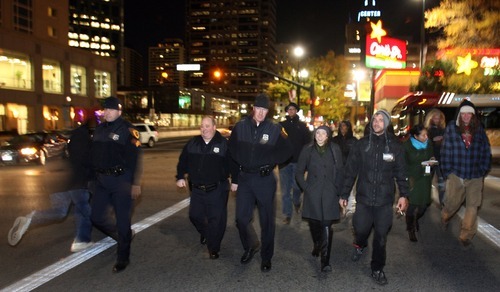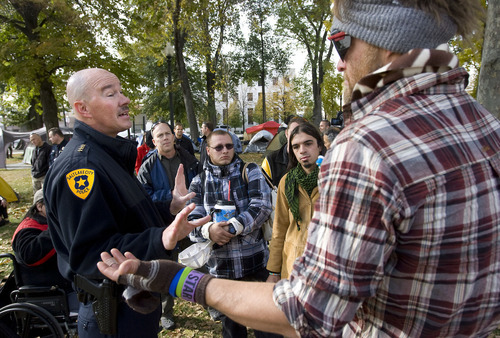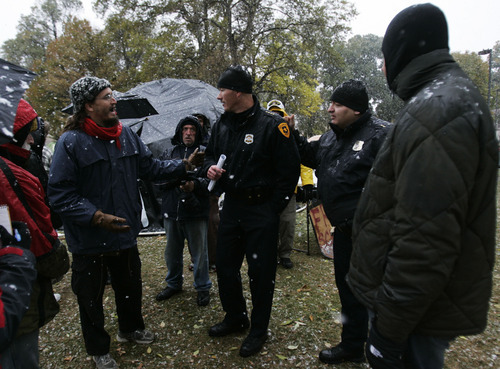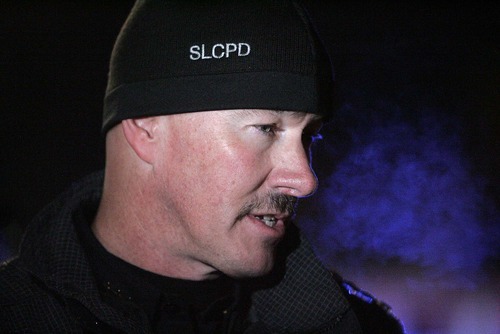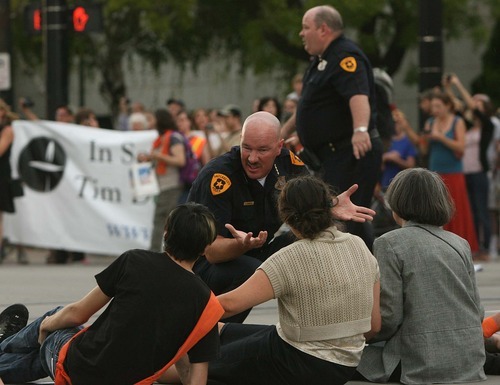This is an archived article that was published on sltrib.com in 2011, and information in the article may be outdated. It is provided only for personal research purposes and may not be reprinted.
There came a moment, during what could have been an ugly confrontation, when an Occupy SLC activist tried to shout down Police Chief Chris Burbank.
Burbank did what many people, even his critics, say is typical: He listened quietly, explained why he was about to do what he did, then went about the business of clearing Pioneer Park of people, tents and trash.
Once the decision to evict the protesters had been made, Burbank didn't flinch from executing the mandate, unpopular though it was. A dozen or so people were arrested, and there were tears and some angry words. But nobody got hurt.
When it was over, even some of those who were ousted were complimentary about how it was handled.
It was vintage Burbank — and a pointed contrast with how similar protests were handled in other cities. It's also a prime reason The Salt Lake Tribune chose Salt Lake City's top cop as 2011 Utahn of the Year. Burbank's stature as a community leader, including a willingness to endure threats and criticism over his position on immigration enforcement, is noteworthy at a time of ebbing confidence in those elected to govern.
Burbank was an anomaly when then-Salt Lake City Mayor Rocky Anderson tapped him in 2006 to lead the department. He was the first chief in 30 years to come from within its ranks. And he is believed to be its youngest.
"Chris really stood out as a level-headed, extremely well-respected officer," Anderson said of his decision to appoint Burbank. "I know that he and I were in agreement in terms of what it takes to do better community policing and adopting a culture within the police department that is, in the end, good for everybody."
Burbank's response to activists who blocked Salt Lake City's Main Street when Tim DeChristopher was sentenced in July foreshadowed his handling of Occupy SLC. Burbank arrived outside the courthouse with a sizable contingent of officers and explained that he understood the protesters were exercising their right to support the man who tried to monkey-wrench an auction of BLM leases. He asked if they wanted to be arrested but told them there was no question the street would be cleared. In the end, 26 people were arrested without incident.
"He was friendly. He was chatty," said Deb Henry, a civil engineer and activist who lives in Sugar House and was involved in both the DeChristopher protest and Occupy SLC. "He helped us to play it out in the way we wanted to happen."
Burbank, who turns 46 in January, defused both situations with public demonstrations of his strategic and people skills. It was a moment he unknowingly may have prepared for all his life.
As a kid growing up in Salt Lake City, and a stint on the East Coast, Burbank describes being exposed to a wealth of cultures. His grandparents worked in theater and regularly entertained colleagues from other countries, giving him "an appreciation for people," especially people who were articulate and freely shared their opinions.
His grandmother, he said, drilled into him the importance of being able to express himself clearly and well.
In college, he majored in sociology because how people communicate and interact fascinated him. The 15 years he spent as an officer with SLCPD prior to becoming chief served as a living laboratory for meeting all kinds of people, from wealthy business owners to Pioneer Park's homeless.
Even those who disagree with Burbank's message acknowledge he is a superb communicator.
Eli Cawley, president of the Utah Minuteman Project, a group that lobbies to stop illegal immigration, calls Burbank "a stooge of the Mexican smuggling cartels." Still, Cawley concedes Burbank is "charming and well-spoken" even as he castigates the chief as " 'Sanctuary Burbank' because he is incessantly mongering amnesty for illegal immigrants."
Burbank has been an outspoken critic of proposed legislation to require local police departments to verify immigration status. He has testified before Congress and written opinion pieces for The Tribune and other newspapers, arguing such laws would jeopardize the relationship between cops and the people they are charged with protecting.
"The essential duty of modern-day law enforcement is to protect the civil rights of individuals while providing for the safety of all members of the communities we serve, equally, without bias," he testified at a meeting of the Subcommittee on the Constitution, Civil Rights and Civil Liberties in June 2010.
Burbank, who always wears his uniform when on duty, says he doesn't worry about what other people think. "My job is not to be popular. My job is to do what's right."
One of his first high-profile decisions as chief to "do what's right" was personally dealing with the emotional fallout of a little girl's murder. On the day 5-year-old Destiny Norton's body was found in July 2006, Burbank was unlacing his boots at home when his staff called to tell him neighbors were angry and "arrests were possible." He laced up his boots and hustled to the scene.
Neighbors were livid that Burbank's officers had been in the killer's house days earlier and didn't find Destiny's body. Burbank said his officers had done all they legally could in questioning the home's occupant that day, but he understood the neighbors' anguish. And leadership, he said in a recent interview, means dealing with the consequences of his decisions.
"My intent was, if somebody has a complaint about the police department or what's going on, that's me," he said of his choice to face a potential mob on that hot summer night.
Henry, the activist, said the city's decision to shut down Occupy SLC at Pioneer Park disappointed her because she and others believed Burbank would continue to negotiate with them. But she wouldn't fault the chief for how he carried out the duty.
"I very much appreciate how things went down," she said. "I do believe Chief Burbank tried to do his best during the evictions to respect us as best he could."
Readers like Jimmer
Jimmer maniacs turned out en masse in online voting for our readers' choice for Utahn of the Year. Of the 294 total votes received as of Friday afternoon, 199 were cast for Jimmer Freddette, the standout BYU basketball player now in the NBA.
The second-leading vote-getter was jailed activist Tim DeChristopher with 32, followed by former Utah Jazz coach Jerry Sloan with 15, and former Utah Gov. Jon Huntsman with 13. Salt Lake City Police Chief Chris Burbank received seven votes.
Among the handful of email and mail responses and reader comments, the leading vote-getter appeared to be "none of the above," as several were unimpressed with the list of candidates. But three people did offer votes for one group that was not on the list: the heroic passersby who lifted a burning car off an injured motorcyclist in Logan.
– Tim Fitzpatrick


